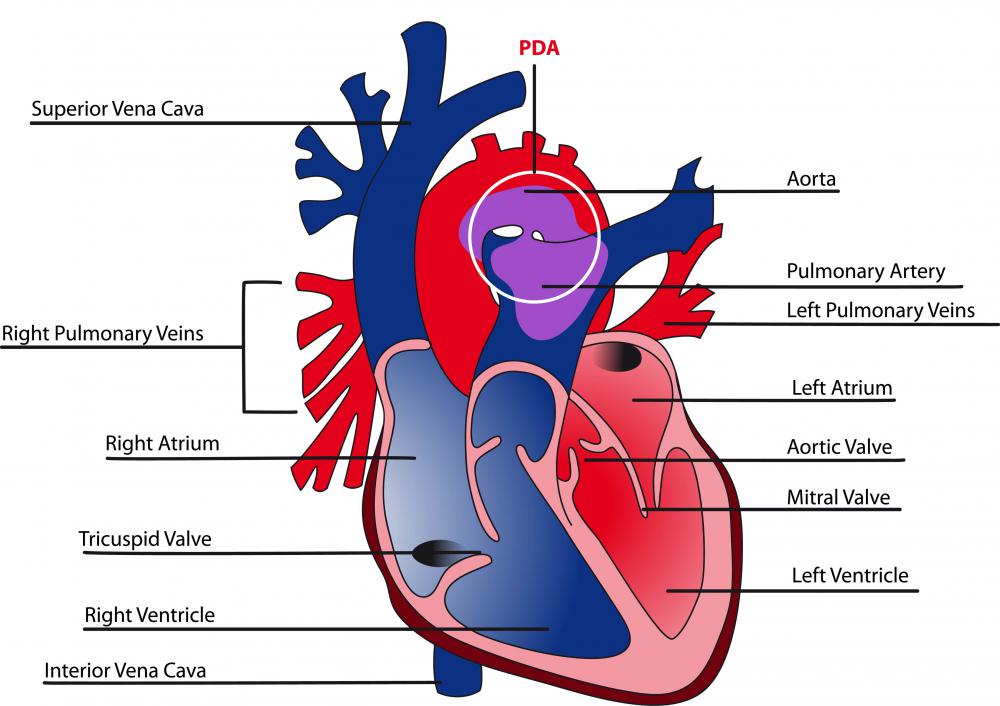At TheHealthBoard, we're committed to delivering accurate, trustworthy information. Our expert-authored content is rigorously fact-checked and sourced from credible authorities. Discover how we uphold the highest standards in providing you with reliable knowledge.
What Is the Pathophysiology of Congestive Heart Failure?
The pathophysiology of congestive heart failure is the progression of physiological changes that define marked deterioration in heart function. Mild at the start, symptoms associated with the pathophysiology of congestive heart failure worsen with time to ultimately threaten heart health. Treatment for congestive heart failure (CHF) is centered on slowing cardiovascular deterioration. Medication and surgery are routinely utilized to ease symptoms and alleviate conditions that may contribute to decreased heart function.
Annually, more than 500,000 Americans are diagnosed with congestive heart failure, which carries a five-year survival rate of just over 50 percent. Early signs of CHF, such as a decrease in physical stamina and persistent shortness of breath, usually prompt a visit to one’s physician. Diagnostic tests designed to evaluate cardiovascular function, including echo- and electrocardiograms, are primary tools used to diagnosis CHF. Symptomatic individuals may also undergo X-ray, blood panels, and a cardiac catheterization to evaluate the physical condition of the heart and assess its function and evaluate arterial function around the heart.

Initial signs of the pathophysiology of congestive heart failure are oftentimes subtle. Individuals who experience persistent fatigue or episodic physical weakness may dismiss the signs as stress-related or attribute them to insufficient rest. Some people may develop decreased appetite or experience bouts of nausea, which can be mistaken for early flu symptoms. As congestive heart failure progresses, an individual may exhibit pronounced weight gain resulting from fluid retention caused by the heart’s diminishing ability to circulate blood throughout the body.

Related to the pathophysiology of congestive heart failure, decreased heart function often contributes to widespread organ dysfunction. Fluid retention that contributes to weight gain eventually begins to adversely affect organ function. Compromised blood circulation can promote fluid accumulation in the lungs causing congestion and shortness of breath that progressively worsens. Impaired blood flow may also trigger episodic dizziness or lightheadedness due to the decreased blood flow to the brain. The prolonged impairment of blood circulation through the heart itself can result in a myocardial infarction, or heart attack, and tissue scarring.

In order to slow the effects of congestive heart failure, medications, proactive self-care measures, and surgery may be used. Medications designed to ease arterial constriction, lower blood pressure, and promote heart flexibility are frequently prescribed. In some cases, hospitalization may be necessary to stabilize one’s condition. Individuals with CHF are encouraged to pay close attention to their symptoms and report any significant changes to their physician.
To alleviate underlying contributory factors of CHF, surgery may be recommended. Arterial stenting, valve replacement, and coronary bypass are among the most common surgical procedures performed. Implanting a pacemaker or defibrillator may also aid with slowing the effects of the pathophysiology of congestive heart failure. There is no cure for CHF.
AS FEATURED ON:
AS FEATURED ON:













Discuss this Article
Post your comments